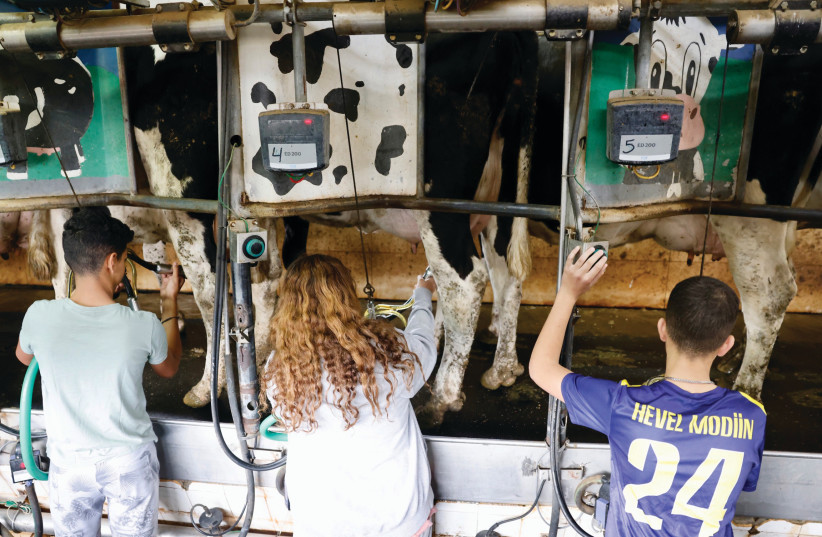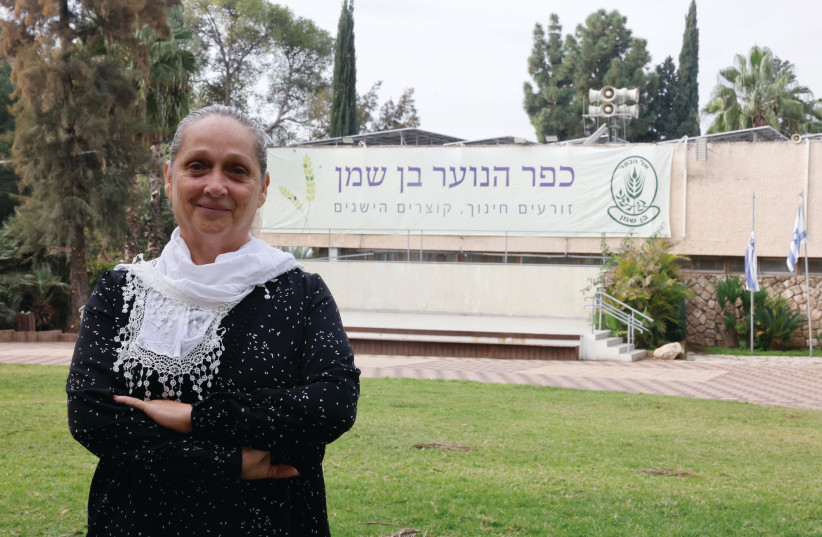Off the highway in Ben-Shemen is a small village housing and educating 400 children. At 9 a.m., most of the students are in the school on the complex, but at the village’s cowshed, around 15 children are eating together. Having just finished milking the cows, the cow wrangler has made them breakfast, but they are all too happy to leave their meal for a few minutes to pose for photos with the cows.
Other children are walking around the complex on their way to therapy or theater rehearsals, while others are doing some gardening. Whatever they’re doing, they all stop for a second to greet the village’s director, Dr. Ilana Tischler, with a smile and “good morning.”
This is the Ben-Shemen Youth Village, one of 46 that are placed all across Israel giving children and youth a home and an education. They are all on the brink of collapse.
A youth village is a complex for children aged six to 18, and in some cases until 26, that includes a dorm, a school, agriculture and any other things a child might need, like therapists and other support. The inhabitants in such a place are varied, but they all have one thing in common: They would not have at home the encompassing care they receive in the village.
The children are referred to the villages for many reasons. They may have been removed from their homes for welfare reasons, such as economic difficulty, unemployed parents or abusive environments, but there are also children whose parents are at work until the evening, meaning there is no one home for them when they get back from school.

Other youth may have been kicked out of their ultra-Orthodox homes because they are not religious, or they may have wanted to leave home because they don’t get along with a stepparent, while others arrive at the villages because they needed to be pulled out of their schools due to severe bullying.
Sometimes the residents in the villages are the children of former students who want their kids to have a similar childhood and education.
At these villages, the residents receive the meals they need and a full education, participate in extracurricular activities and gain work experience in the various agricultural endeavors within the village such as cows, growing vegetables and making olive oil.
Aside from the practical services they get in the villages, the youth also provided with therapy when they need it, including animal-assisted therapy, art therapy and other types provided by the psychologists employed in the complex.
Tischler, who has just begun her 15th year working in the village, underlined the importance of these institutions for the kids who attend them.
“Most of these children, if you left them in their regular routine, would fall,” she said. “This system provides a solution” for children from all walks of life in Israel who need the help.

She added that another reason the villages are important is that it breaks a cycle of generations of children who cannot make it out of the difficult situations they are born into.
“Every one of these kids that we help is later not a burden on the shoulders of the country, as someone unemployed with no bagrut [matriculation] who cannot work. A kid who works in agriculture here twice a week will know what work is when they go out to the real world.”
The 2021/22 academic year, Tischler said, saw 96% of students finishing their high school education with a full bagrut certificate.
She added that many of the residents who go through youth villages grow up to be leaders in society, such as former prime minister Shimon Peres, Defense Minister Benny Gantz, former prime minister Yitzhak Rabin and Economy Minister Orna Barbivay.
<br>On the brink of collapse
There are approximately 12,000 residents in all the youth villages countrywide. Supplying all these children with the food, clothes, supplies, education and care that they need requires a lot of money, but Tischler said that they are not getting as much as they need from the Education Ministry, which is supposed to supply them with that budget.
Every child who arrives at the village is given a personal plan so that they can get the best individual, educational, social, physical and mental health plan they can get.
The youth villages are funded by the ministry, the villages’ industries, such as selling milk, lettuce and eggs, and donations. For the two villages that are authorized to take in children from welfare homes, the Social Services Ministry also supplies a budget per child.
The Education Ministry said in a statement that it was relying on the Finance Ministry for the budget.
“In order to bridge the gap in budgeting, the Finance Ministry needs to transfer NIS 56 million to us,” it said. “The matter has been made a high priority in the ministry’s demands for the government when budget debates are renewed.”
Asked how long it has been since the budget was updated, the ministry replied that it didn’t know an exact number of years. All it could say was “many years.”
According to Tischler, the village industries and the donations are not enough to keep them going, and the financial situation is constantly worsening.
“The situation we’ve seen in the last decade is that every year, prices rise and we get less of a budget, and this gap keeps widening,” she said.
There are many factors that led to this situation, according to Tischler, one of which is the political situation.
“In the last three years, we’ve had five elections,” she said. “There’s no one to talk to unless it’s very important to someone.”
The prime minister-designate has until the end of the week to form a coalition, and Tischler doesn’t want to think about what might happen to the youth villages if he fails.
Such a case would mean that their budgets would be delayed again, and she thinks Ben-Shemen, at least, would collapse.
And what will happen to the kids?
“Some of them will go home, and some will be thrown out on the streets,” said Tischler.
But not all the youth who would go home will get what they need.
“What kind of homes are they going to? Do they get enough food? Do they have someone to make sure they’re getting their education? Can they be given emotional help if they need it?
The answer for many of these youth, unfortunately, is no.
Tischler feels that the matter is not pressing enough to the Education Ministry, however.
“These are children who are on the periphery, and the country doesn’t see them,” she said.
In the last few years, Tischler has had to work harder than ever to keep her village running, and the children’s care is affected by it.
“In the last few years, I have needed a lot more donations to give the youth the care they need,” she said. “As much as possible, we won’t touch their core needs. I won’t change anything about their food, and I won’t stop them from getting heating in their rooms when they need it, but the other things that I want to give them, I cannot.”
It’s not just the kids who are in the village who are affected, however. When the villages were getting the budgets they need, Ben-Shemen was taking in 100 new people a year, but now it cannot manage more than 70, meaning that every year, 30 children who need the village cannot receive the help they need.
“I have nowhere left to cut costs,” said Tischler. “All I can do is work as hard as possible to bring in more money. This is the first time in 15 years that I feel like I’m at a dead end here.”
